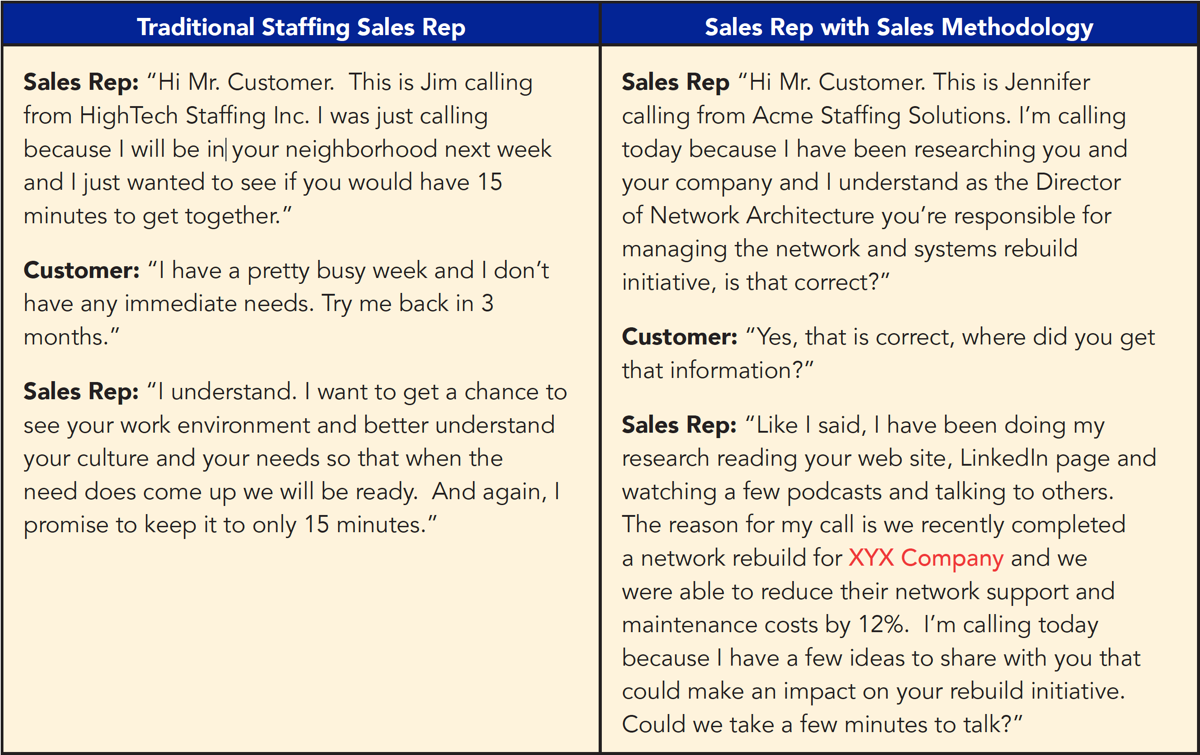Sales Methodology 101 for IT Staffing Firms
Revenue Achievement & Scaling Problem
Most IT staffing firms have no idea how to replicate their sales success. If pressed, even the most successful sales reps would have trouble pinpointing exactly what makes them so successful. It just comes instinctively.
For the hundreds of small IT staffing firms across the country stuck below their revenue goals and trying to scale, this is a problem.
It’s one thing to take a deal from opportunity to close. It’s another thing entirely to identify the steps you went through and the techniques and tools you used along the way, so that other people can replicate your success. This is what sales strategists, sales trainers, and sales effectiveness consultants like me talk about when we talk about a sales methodology.

Warning Sign #1: Most of Your Sales Reps Aren’t Hitting Their Quotas
If 80 percent of your firm’s revenue is coming from 20 percent of your reps, clearly the winning tactics your top reps use are not making their way to the rest of the team.
Warning Sign #2: Sales Effectiveness is Inconsistent Rep to Rep
 Take a closer look at how your top few reps have performed over the last six or eight months. Pay attention to the following metrics.
Take a closer look at how your top few reps have performed over the last six or eight months. Pay attention to the following metrics.
- Raw dials to connects.
- Connects to qualified leads (hiring managers).
- Qualified leads to meetings.
- Meetings to new job orders.
- Submittals-to-interviews ratio.
- Interviews-to-offers ratio.
- Sales win rate percentage.
Now look at your entire team in each of these areas. How do your core performers compare to your top performers? Are the results all over the map? If so then your numbers are telling you it is time to implement a sales methodology.
Imagine how your revenue would grow and your business would scale if you could improve the overall effectiveness of your entire team.
Warning Sign #3: One Branch Is Outperforming the Others — By a Lot
Does this sound familiar? Your headquarters in Boston is growing revenue at a steady clip while your Dallas branch bounces up and down — and your D.C. branch can’t seem to get off the ground at all.
Why is there such a discrepancy between locations? It’s not because there’s less demand for IT staffing services in those areas. All indications are that IT staffing is a healthy industry, expected by most experts to continue to grow.
The problem here is that every rep, at every location, is doing their own thing. Some reps are more effective than others, but none of them have a consistent methodology guiding their actions. Without consistency, IT staffing firms can’t scale. Lack of a sales methodology is one of the primary reasons so many firms have plateaued, despite the huge opportunity in the industry.
Warning Sign #4: Your Gross Profit Margins are Inconsistent Rep to Rep
How is it possible that a sales rep selling the same services for the same company to virtually the same customers is averaging 22 percent gross profit margins and your other sales rep is averaging 27 or even 30 percent gross profit margins? Lack of a sales methodology.
Just imagine the impact on your bottom line if all of your reps averaged 27 percent margins!
 The concept of a sales methodology can be confusing. It’s especially confusing when sales experts like me throw around similar-sounding terms like “sales process.”
The concept of a sales methodology can be confusing. It’s especially confusing when sales experts like me throw around similar-sounding terms like “sales process.”
Here, we’ll delve into some of the details, answering some of the most common questions IT staffing professionals like you have about sales methodologies.
Question 1: What Is a Sales Methodology and How Is it Different From a Sales Process?
In one of my recent ebooks, “5 Ways to Drastically Overhaul Your Sales Training Program and Boost ROI,” I noted that one of the first things you should do to improve your IT staffing firm’s sales program is to map out your sales process. If you read that ebook, you’re probably thinking, “I’ve done that, so I’m all set. Right?”
Wrong. The concepts are related, but having a sales process does not mean you have a sales methodology — or vice versa.
- A sales process defines the steps that a sales rep and a customer need to take to complete the purchasing process, from opportunity to close.
- A sales methodology describes how to execute each step within your sales process, and details how your sales rep will move the prospect from one stage of the sales cycle to the next.
 A Sales Methodology is How You Execute the Steps in Your Sales Process
A Sales Methodology is How You Execute the Steps in Your Sales Process
Think of your sales process like a map. A map will show you the route from point A to point B, but if you encounter an obstacle along the way, your map won’t help you get past it. Simply knowing your destination lies over a tall mountain isn’t enough. To get over that mountain, you need climbing equipment and the skills to use them. That’s your sales methodology.
Your Sales Methodology Comes from Your Sales Philosophy
My partner here at Menemsha Group, Gerry Gadoury, explains that a sales methodology is “externally focussed,” that is, “It expresses how you engage your prospects and your customers.” Because of this, your sales methodology emerges naturally from your sales philosophy and values.
For example, at Menemsha Group, we firmly believe that IT staffing prospects expect the time they spend with a salesperson to be a valuable use of their time. So when you look at our call plans, how we execute a call, or how we conduct a sales meeting, you’ll see our emphasis is always on providing value.
Our sales philosophy and values are baked into our sales methodology.
Question 2: Why Will a Sales Methodology Help My IT Staffing Firm Sell More Effectively, Close New Accounts and Grow My Revenue?
On any map, there are a million different ways to get from point A to point B. It’s the individual steps along the way that make all the difference. In the IT staffing business, customers judge you on how you present yourself and how you engage them; your methodology is how you differentiate from the competition.
Here are three other ways having a sales methodology will help your IT staffing firm achieve sustainable, repeatable growth:
1. Sales Methodology Accelerates New Hire Training & Onboarding
Most IT staffing firms try to hire salespeople with industry experience and/or a “proven track record.” They hire them, provide company and CRM/ATS training, have them shadow a top performer on sales calls and sales appointments, and then leave it up to them to go figure it out. Instead of waiting for your reps to figure it out you can accelerate new hire time to productivity by providing them with a proven set of best practices and approaches that you already know works.
Train new reps on your sales methodology and reinforce the training by giving them a sales playbook that supports your methodology on day one. Armed with a sales methodology, your new reps will “figure it out” much quicker.
This approach is also scalable; you can put as many reps through methodology training at the same time as you need. With shadow training, how many new hires can feasibly shadow your top performer at the same time?
Finally, training your new hires on a proven methodology will deliver predictable results. Without a sales methodology you can’t determine what is working and what is not working across your sales team.
2. A Sales Methodology Will Bring Consistency to How You Sell
When your firm follows a sales methodology based on best practices consistently, from lead to lead, and opportunity to opportunity, you will improve your sales effectiveness and efficiency. You will close more deals more often and increase your deal size without having to increase your sales activity output.
The prevailing wisdom in the IT staffing industry is that the only way you can make more deals is to make more calls. A good sales methodology turns that idea on its head.
3. A Sales Methodology Allows You to Build Consistent Training and Hiring Programs
You can construct a new hire onboarding and training program around the execution of your sales methodology. This will ensure that all your sales reps — no matter where they’re based geographically — get trained in the same, consistent manner and they get trained to follow and use the same sales techniques.
With a sales methodology, successful sales tactics become easier to replicate, allowing your firm to scale and grow. The reps that follow your sales methodology will know when they’ve successfully completed the steps in the sales process to move forward.

Question 3: How Can a Sales Methodology Directly Impact My Results?
According to one Accenture study, sales reps who use a sales methodology 90 percent of the time achieve 70 percent of their targets. On top of that, the study found, 92 percent of reps who consistently used a sales methodology achieved their quota. We’ve found that, on average, only 50 percent of IT staffing sales reps are meeting quota. What percentage of your sales reps are meeting or exceeding quota?
The example below shows a sales methodology in action. On the left, a sales rep without a methodology struggles to get a follow-up meeting with a prospect. The rep on the right, on the other hand, is following a sales methodology that dictates she should always provide value in her interactions with prospects. Which rep do you think will move the deal forward?

With a sales methodology, win rates go up, sales cycles are shortened, sales reps meet their quotas, and the entire team feels confident no matter what situation they find themselves in with prospects. This is why one of the IT staffing firms we worked with, Selectek, was able to increase revenue by over $1 million and gross profits by 26 percent within a year after implementing our sales methodology.
Question 4: What Are the Key Elements to Include in a Sales Methodology?
So now you know what a sales methodology is, why your IT staffing firm needs one, and how it will help you achieve your revenue growth goals. But how, exactly, do you go about building your sales methodology?
Here are the basic steps involved:
- Map out your firm’s sales process. Head back up to question 1 if you’re unclear on the difference between a sales process and a sales methodology.
- Qualification criteria. This defines the information needed from the prospect in order to determine if the buyer is worth pursuing and if we can help the prospect.
- Break down each step of your sales process into individual “customer touch points,” in which the sales rep interfaces with the prospect across each stage of the sales cycle.
- Plan how you want your sales reps to execute each step and “touch the prospect” based on your sales values, balancing those values with the best possible technique for achieving your desired outcome.
An Example:
Let’s assume you’re at the stage of the sales cycle in which your customer must schedule an interview with your candidate. Your sales methodology might detail any of the following:
 The point in the sales cycle the at which the rep attempts to schedule the interview.
The point in the sales cycle the at which the rep attempts to schedule the interview.- What medium (phone, email, face to face, other) the rep should use to schedule the interview. A different methodology probably applies for each medium
- A call plan that dictates what information is needed by the sales rep prior to asking the client to schedule the interview.
- A call script for what the sales rep will say to schedule the interview.
- Rebuttals to common objections for when clients resist scheduling the interview (fail to commit to the next step in the sales process).
As you can see, a well-defined sales methodology can get very specific for each step in the sales process. The more specific it is, the more repeatable — and therefore trainable — it is.
At Menemsha Group, we help IT staffing firms implement a sales methodology that includes four main “buckets,” with detailed steps for each area: new account development, opportunity management, key account development, and sales metrics.
Question 5: How Do I Get My IT Staffing Firm’s Sales Team to Follow a Sales Methodology?
It’s human nature to resist change — perhaps for sales reps most of all. But If no one follows your sales methodology, it won’t have much practical value for your IT staffing firm. How do you get your existing team of set-in-their-ways sales reps to follow your new methodology?
The most common mistake made by companies when they implement a new methodology — or a new anything, really — is overemphasizing the design and launch of the program and under-emphasizing what comes after. In other words, they are not prepared for the amount of effort it takes to sustain and reinforce the change so it permeates the entire organization.
To make a new sales methodology “stick,” first ask yourself three questions:
- What is the degree of change required by your organization for the methodology to be implemented and adopted?
- How much change management is needed to sustain and support the sales team so they adopt the methodology long term?
- What level of support is the executive leadership team able and willing to commit to for supporting their sales team in the adoption of the new sales methodology?
Remember, change is a process, not an event. Sweeping edicts handed down from the corner office don’t usually get very far. As a leader, you need to map out what your sales team can expect from their managers, including how they’ll be supported, how they’ll be coached, and how they’ll be evaluated on what they’ve learned in their training on the new methodology.
We recommend creating a user adoption plan that includes things like:
- A consistent and unified communication from the entire management team that supports the changes needed to implement and support the program permeating your entire organization.
- Weekly coaching calls between managers and reps.
- Monthly coaching calls between the sales leader and sales managers.
- Quarterly workshops for everyone, including senior leadership, to practice and reinforce the methodology.
- Monthly meetings hosted by executive leadership sharing best practices and success stories.
For change to take hold, everyone, from the top on down, needs to be bought in and on board.
(For a more detailed discussion of the concept of change management and how it applies to IT staffing firms, read my recent article, “How to Train a Sales Team the Doesn’t Want to Change.”)
Question 6: If I Don’t Have a Sales Methodology, Where Can I Get One?
In question 5, I described a process for building your own sales methodology. Understandably, most IT staffing firms have neither the time, the resources, nor the expertise to complete this process on their own. Very few IT staffing firms have a sales methodology which is why it is so difficult for them to differentiate while the most successful IT staffing firms either built their own or use a third party sales methodology.
So which third-party methodology should you choose?
Legacy Sales Methodologies
There are a number of well-known and widely-practiced “general purpose” sales methodologies on the market. You may have heard of some of them: SPIN Selling, Solution Selling, the Challenger Sale. These approaches all have their strengths and weaknesses, but here’s their biggest weakness: They’re designed for companies that are selling multi-million dollar solutions. Does that sound like your IT staffing firm?
A Sales Methodology Custom-Built for IT Staffing Businesses
At Menemsha group, we have designed a proven methodology exclusively for selling IT staffing services. I created our sales methodology after spending more than 15 years selling and leading sales teams in the IT staffing and consulting industry. It works for anyone selling IT staffing services in a customer facing role — rookie or veteran — who wants to demonstrate value to their customers.
Our sales methodology is designed to minimize customer objections, uncover customer needs, and build value for the customer while providing insights into how buying decisions are made. For your sales team, it will provide genuine skill development in a variety of areas, along with a platform for making permanent changes in sales behaviors.
Download your copy of this eBook.

What to do next
To learn more about Menemsha Group’s sales and recruiter enablement solution including how we leverage innovative technology and modern learning methods to make winning behaviors repeatable and deliver predictable revenue growth, download our eBook, Menemsha Group’s Sales & Recruiter Enablement Roadmap for Scalable Growth. In the eBook you will discover the tools, technologies, techniques, methodologies, content and processes we employ to help staffing and recruiting firms attain scalable, repeatable success.



